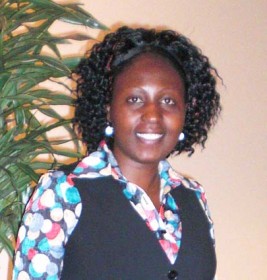In Guyana, access to a local newspaper is as easy as any Sunday morning, except for those who live in the rural areas, who would have to wait for the newspapers to arrive at a local vendor in their area before being afforded the opportunity of reading the news. Or, as in the case of those in the interior of Guyana, one copy of a newspaper would be circulated to practically everyone in the community to read, some persons adding their part to the articles as they pass on the information. In some cases persons just do not read the news and as such, what exists in the newspaper is of no concern to them.

In Kenya however, the case is a bit different. Young Kenyan television producer/ reporter Violet Otindo received the CNN African Journalist of the Year Award this year, for stories she reported on in the Kenyan capital of Nairobi. According to Otindo, reading a newspaper in her village, located miles away from Nairobi, is a luxury.
Otindo grew up in the rural areas of western Kenya, where she noted, “you have to be rich to buy a newspaper”. She said villagers in the area did not and still do not have much access to television/print news, and whoever does, they are usually in the upper bracket of society.
“Buying a newspaper was a big thing when I was growing up there in the countryside. It still is,” she said.
She said she had a passion for working in the media while growing up but she could not decide what aspect of media work she wanted. One’s future aspirations in rural Kenya are usually dampened since “you grow up in poverty”, she said.
With a positive look in her eyes, Otindo said she was focused on studying at a university in Nairobi, stating that it was definitely on the agenda. But while waiting for that ‘dream’ to be fulfilled she would listen to the radio, which she said was like a ritual, since it was the only thing available for keeping oneself in tune with the outside world.
She said her father assisted her in looking for a college where students would be sponsored in part by the government, and after a number of such searches and interviews she was able to attend a university where she studied for three years. She obtained a diploma in Mass Communications on completion of the programme.
She said while completing her studies she entered the world of work and did freelancing with several news agencies in Nairobi. After looking around for some time, Violet noted that K24, a television network in Nairobi, came into being. She said someone who once worked with CNN afforded her the opportunity to work for the television station and she soon started her own TV show, which features social issues. The half-hour show quickly became popular in the area where the TV station is located, since according to Violet, the show is all about the people and the issues affecting them.
She said some time last year, someone encouraged her to enter the African Journalist of the Year award competition hosted by CNN and she submitted six entries — three news features, the others being sports and crime related. The entries were submitted for the Environmental Award category.
Then, she hit the roof when one of her entries was shortlisted by the panel of judges. The entry was based on a news story about a slum area in Nairobi. She said the entry entitled, Embakasi 1and 2,which is available on YouTube, featured the voices of the young and the old, the vulnerable and the neglected, who were on the brink of a major environmental and health disaster. According to CNN, the journalist gave a voice to the people who obviously know their environment best. What was desperately missing were the people to fix the problems and according to CNN, there was no expert-speak; the story goes to the heart of the matter and unfolds itself in the plain language of the hurting community.
Otindo described the slum area known as Embakasi, as poverty in reality. “I wanted to bring attention to the area which has about 50,000 people with no sewerage system, no proper toilets,” she said.
She said after winning the award, she managed to speak to a government official who promised to assist the area but to date, nothing much had been done to bring change in the area.
Since winning the award, Otindo said, her life and the show have changed a bit — the show has a wider audience and has become popular and more importantly, more credible. “They got my name through CNN,” she said.
She also noted that she would choose an area within Nairobi, and go about making her stories, doing the job of three persons, editing, shooting and compiling the script for each story.
Otindo’s words of encouragement for emerging journalists are “let the people’s voices be heard” noting that most journalists only talk and write what they want their audiences to hear. She also encouraged those in the profession to enter as many competitions as possible, since, she noted, these give credibility while opening doors of opportunity at the same time.
Otindo was in Belgium last week attending the Technical Centre for Agricultural and Rural Cooperation (CTA) conference where she addressed those attending the conference about life in Nairobi.





